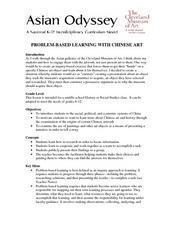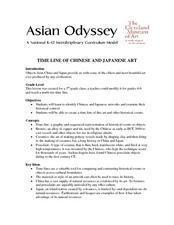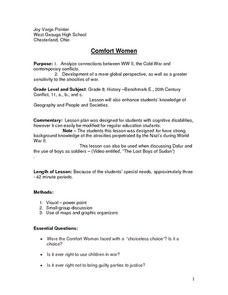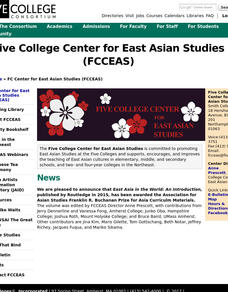Curated OER
The Early Development of Korea
Students examine the early development of the country of Korea. Using maps, they identify how geography of the country has contributed to its isolation. They use the internet to research how China influenced Korea and what achievements...
Curated OER
Brushstrokes From West to East
Students meld their ideas about art with the philosophy of the Chinese. They discuss each art project, discover the history and culture of each project in China. They create a tea ceremony and various Chinese art projects.
Curated OER
Problem-Based Learning With Chinese Art
Students form small, cooperative learning groups, research a major Chinese dynasty and present their findings to the classroom in this multi-day instructional activity adaptable to many different age levels.
Curated OER
Asian Museum Exhibit
Seventh graders role play the role of a curator of a local museum. In groups, they develop a new exhibit on Asia. They research specific countries in Southeast Asia and present their exhibit to the class. Art must also be included in...
Curated OER
Haiku and Beyond: Exploring Genres of Japanese Literature
Fourth graders compare and contrast the literature of Japan as they study the culture, history and geography of the island nation. They read various genres of literature, describe geographic and landform features of Japan, and find...
Curated OER
Word Play
Students examine the Japanese folktale, Monkeys Grasp for the Moon. In this multicultural literature lesson, students discuss the theme of the folktale. Students choose animal folktales from other Asian cultures for comparison.
Curated OER
Japan
Seventh graders identify some key concepts, ideas, and facts about Japan. Students identify shared traits and differences of Japan as compared to other asian countries. Students identify how geography can affect the culture of a place....
Curated OER
Confucius: Words of Wisdom
Students view a documentary on Confucius. He is revered as one of the greatest teachers in history. Confucius' name is synonymous with ageless wisdom. After viewing, students discuss what they saw then complete writing and art activities...
Curated OER
Time Line Of Chinese And Japanese Art
Students create individual time lines placing various works of Asian art into chronological order. The information gathered is used to create one class time line for display.
Curated OER
The End of United States' Occupation of Japan
Ninth graders examine and discuss reasons for end of U.S. occupation of Japan in 1952, locate surrounding Asian countries on map, explore changes to Japan after World War II, and discuss how changes in Japan impacted other countries.
Curated OER
Words in the News Japan Textbook Back in Spotlight
Students participate in vocabulary and word work activities before reading an online article. They concentrate on verb tenses and re-write a portion of their personal, school or country history that includes false information.
Curated OER
Comfort Women
Ninth graders analyze connections between WW II, the Cold War and contemporary conflicts. They discover a more global perspective, as well as a greater sensitivity to the atrocities of war, and how the atrocities against the...
Curated OER
Introduction to Korea
Students explore the culture of Korea. In this Korean culture lesson, students examine visual and textual works regarding Korea. Students also examine dance, architecture, and food of the country.
Curated OER
Opportunity and Danger
Students analyze the immigrant experience. In this Chinese immigration lesson, students research Internet and print sources regarding the topic. Students also watch videos regarding the topic and interview immigrants or children of...
Curated OER
Importance of Rice
Third graders explore the importance of rice in our world. In this rice farming lesson, 3rd graders discover how much rice we use on a daily basis. Students also discover myths from other cultures about rice. Students color code a map of...
Curated OER
Stolen Property or Finders Keepers
Students explore the questionable acquisition of priceless artworks gained as spoils of World War II. They become investigators and reporters looking into the matter of ownership of the world's greatest art.
Curated OER
Banding Together
Students explore the effect that a particular culture can have on popular music. They develop their own music groups, each representing a style of music and a historical culture and perform their group's concert for the class.
Curated OER
In Perfect Harmony: Teaching the World to Sing
First graders listen to music as the impetus to learn about the concept of Japanese harmony as it is understood in Japanese culture. They use the New Seeker's song, "I'd Like to Teach the World to Sing," to compare America and Japan...
Curated OER
Origami Paper Fun
Students explore the art of Origami. They listen to various stories about Japan, create Origami shapes by following step-by-step directions, sing Japanese songs, locate Japan on a map, and take a quiz.
Curated OER
Nutrition: How important is rice to the world?
Fourth graders point out places on a map that grow rice around the world. In this rice growing lesson plan, 4th graders read about the importance of rice and use a map to see where it comes from.
Curated OER
Guidelines for Governing: Utopia and The Prince
Students explore the power of the Church in government. In this literature lesson, students read Sir Thomas More's Utopia and Niccolo Machiavelli's The Prince. Students respond to questions regarding the works and discuss them.
Curated OER
Children in the United States and Japan
Young scholars locate Japan on a map or globe and describe the relative location of Japan. They use the Internet to investigate cultural characteristics of children in the United States and in Japan. They use a Venn Diagram as an...
Curated OER
Haiku
Students study various forms of poetry and the culture of Japan. They are introduced to a haiku- a traditional form of poetry and an art form in the Japanese culture. They write a haiku and create a student haiku booklet with the classes...
Curated OER
Role of "Outsiders" And Traders in Society
Students examine the Chinese and Japanese conceptions of "insiders" and "outsiders" and how this affects the attitude toward foreign traders from the 6th to the 16th centuries. Lesson extensions are included.

























